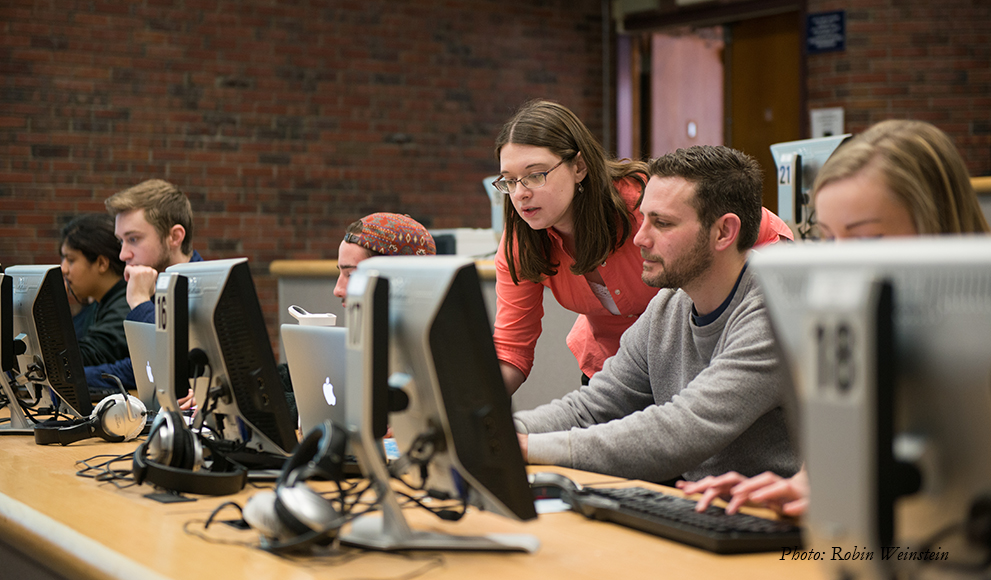Where can a humanities major take you? For three alums, the answer is: “Anywhere you want.”

Nearly a quarter of Wellesley students choose a dual major; three alums explain why pursuing their passions, through double majors in the humanities, was a satisfying and smart choice.
Joanna (Annie) Swafford '06, now an assistant professor of interdisciplinary and digital teaching and scholarship at SUNY New Paltz, majored in English and music at Wellesley. "I wouldn’t have my current position if it weren’t for my double major," she said. "I’m proof that majoring in the humanities can be just as practical as majoring in a STEM field."
A self-professed bookworm who'd played piano and clarinet for years, Swafford’s professional journey began, she said, when she wrote her senior thesis on Ralph Vaughn Williams' musical setting of Dante Gabriel Rossetti's sonnet cycle, The House of Life. That project brought two of her passions together, but also made her realize that "it was hard for my literary readers to understand my arguments about music, since they didn’t know how to read a musical score," she said.
The experience taught her the importance of understanding—and meeting—the needs of various audiences, something humanities majors do well, she said. As a doctoral student in English at the University of Virginia, she expanded on the ideas in her undergraduate thesis and searched for a solution to the problem she'd encountered earlier. The result: "I learned how to program computers and invented a new publishing framework for musico-literary scholarship that brings together a score and a corresponding audio file by highlighting the score in time with the music so that everyone, regardless of musical expertise, can follow along," she said.
Today, she is introducing a new generation of scholars to the digital humanities, and teaching them to combine their own dual interests. That may be the wisest—and most satisfying—approach, both now and in the future, she said. "Many businesses (including Google and Twitter) are eager to hire humanities majors because of our skill with telling stories, writing, communicating, researching, and analyzing," she said. "The world changes quickly, and jobs that we currently train people for could easily be replaced in the future, whereas jobs that we can’t even imagine now could become the ones in high demand by the time incoming undergrads have entered the workforce," she said.
Isabella Dougherty '15 studied Chinese in high school and planned to take advanced language classes at Wellesley. She became interested in economics as well after taking a microeconomics class with Daniel Fetter, assistant professor of economics, in her first year. She graduated with a double major in Chinese language and culture and economics.
As she told the Boston Globe this summer, "The professor really hooked me in … found applications for every unit, every model that we studied so we could apply what we were learning in class to real-world policy decisions, like the Affordable Care Act," she said.
Dougherty's dual major allowed her to understand how the history and culture of China have been shaped by public policies and programs. "While the economics major is quite quantitative, the Chinese major is much more qualitative and requires a different type of thinking." she said. "The two complement each other well and taught me how to be a global citizen."
Dougherty began working this fall as an analyst at Charles River Associates in Boston. Later this year, she plans to take the Hanyu Shuiping Kaoshi, also known as the Chinese Proficiency Test, China’s only standardized test for non-native speakers. "If I pass, that will allow me to work in China for Chinese firms rather than simply being hired as an expat or being sent on a global rotation," she said. "Passing the exam will also be a strong signal to future employers about my understanding of the culture, which is possible because of my liberal arts education."
Emma van den Terrell '15 "fell in love with studying religion," she said, after taking an ethics course with Stephen Marini, Elisabeth Luce Moore Professor of Christian Studies and professor of religion, during her first year. She began taking peace and justice studies classes as a sophomore because the two subjects fit so well together.
"You often hear about religion and violence in the news, but this is not the whole story," she said. "Religion is an integral force in peace processes as well. Both majors have helped me think critically about conflict and violence."
Van den Terrell’s dual background has been especially helpful with her work at the Berlin Center for Torture Victims, which operates a network of rehabilitation centers in North Iraq in partnership with Jiyan Foundation for Human Rights. These centers provide free physical and mental rehabilitation services to survivors of torture and human rights violations.
"My background in the humanities has taught me to approach human rights work holistically," she said. "How someone uses language is just as important as the content. Any work done without careful thought, cultural sensitivity, historical knowledge, and understanding of the ethical framework can cause more harm than good."
